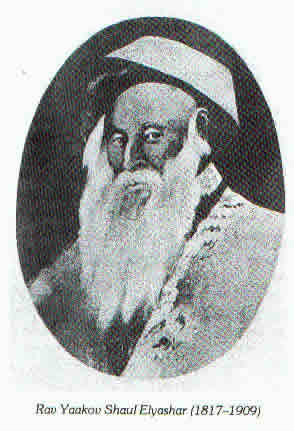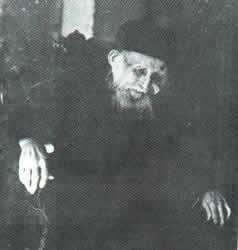Being a rabbi is a goal that some Jewish scholars aspire to reach. The duties of local rabbi are varied and as colorful as the rainbow. He gives sermons, leads some of the prayer services, and partakes in all the simchos (joyous events) and in all the funerals. As he grows in wisdom, he is consulted on halachic questions. These can range from what type of toothpaste to use to intricate queries that can bring one to heaven or hell. Sometimes he has to act quickly, based on the collected wisdom he has gained. An error on his part may be the cause for others (and himself) to lose their portion in the World to Come.
In Jerusalem of old, the Chief Rabbis of the Ashkenazim and the Sefardim were venerable sages, respected by the whole community. Rabbi Shmuel Salant, the Ashkenazi Rabbi, was well into his nineties when this story takes place. His counterpart, Rabbi Yaakov Shaul Elyashar, held the illustrious title of Rishon l'Tzyon (the Chief Rabbi of the Sefardic Community). He commanded the admiration of both the Sefardic and Ashkenazic citizens of the Holy City.
One summer evening, Rabbi Yaakov Shaul Elyashar received the following telegram:
Warsaw, July 13, 1906
To the Esteemed
Rabbi Yaakov Shaul Elyashar,
May peace be upon you,
I, the Rabbi of Noviminsk, make the following request in the name of the entire community, asking you to intercede on our behalf at a time of great distress.
A few months ago, a local government official by the name of Nasalink was murdered. In the presence of the court, the brothers Eliezer and Noach Horowitz - presently in Jerusalem - testified that they witnessed the crime and pointed to five gentiles as perpetrators of the murder. Based on their testimony, the five were found guilty and sentenced to death. Now, we expect our gentile neighbors to retaliate in force against us. Therefore, I request that the Rishon l'Tzyon speak to these two men and demand they confess that they only gave their testimony out of hatred for the accused. If they admit the truth, the convicted prisoners will be reprieved from the death penalty, and the Jewish community will be saved from a pogrom.
Please forward their testimony via the Russian consulate in Jerusalem, who will forward it by telegram to the Warsaw authorities.
Signed by
Rabbi Shmuel Yaakov Rabinovitz
Noviminsk, District of Warsaw
Rabbi Elyashar turned to his secretary, Rav Chaim Michel Michlin, and asked him to find the two brothers mentioned in the telegram. An hour later, Rav Michlin returned with the Horowitz brothers, who vehemently denied the accusation in the telegram. They were the sole witnesses to the crime, and everything they said in court was the absolute truth. Nothing could sway them to change their version of the events.

Picture of Rabbi Elyashar
Puzzled by the contradiction between the telegram and the testimony of the brothers, the Rishon l'Tzyon called a special meeting at his house with some other noted rabbis. If the telegram was authentic, then a threat to an entire Jewish community loomed in the air, and an immediate reply was called for.
Rav Michlin read the telegram out loud to the assembled rabbis and told them what the Horowitz brothers said to the Rishon l'Tzyon earlier that day. For the next two hours, the Rabbis discussed and debated what to do, and finally arrived at the wording of a return telegram.
Throughout the long evening hours of discussion, Rabbi Yaakov Shaul Elyashar remained silent. The venerated sage reclined in his chair and stared at the floor. Suddenly, he signaled that he wanted to speak.
"My dear companions," Rav Elyashar began in a low tone. "Before you send off this reply you have formulated, let me present you with my candid appraisal."
Everyone turned to the Rishon l'Tzyon and waited for him to continue.
"My personal opinion is that this telegram is a forgery! The authors of the telegram are none other than the relatives of the convicted murderers, who seek to save their loved ones from death. If the Horowitz brothers retract their testimony, then the whole case against them will fall through.
"But there is a grave danger here," continued the Rishon l'Tzyon. "Should we wire that the brothers spoke falsely, this might incite a pogrom against the Jews of the community.
"Therefore, it is my opinion that we should either do nothing, or if you feel that some reply is in order, we should circumvent the issue by stating that it is forbidden for me, as Rishon l'Tzyon, to interfere with the internal problems of a foreign country."
Silence hovered in the air. Finally one rabbi spoke. "Forgive me, please. But should the telegram not be a forgery, both possible suggestions which you propose could lead to a catastrophe for the Jewish community there."
After a few moments of thought, Rav Elyashar said, "In that case, I recommend that we ask the Rav of Jerusalem, Rav Shmuel Salant, his feelings on the matter. Whatever he says we will do."
Turning to his secretary, the Rishon l'Tzyon called, "Since this matter is of the utmost importance for the safety of hundreds of Jews, please go at once to the Chief Rabbi of Jerusalem and ask him for his advice. Show him the telegram, but do not tell him my opinion."
Though the hour was after midnight, Rav Chaim Michel aroused the ninety-year-old Chief Rabbi of Jerusalem and presented him with all the facts.
Rabbi Salant sat and contemplated the matter for a few minutes. "In my humble opinion, the telegram is a forgery. The Rabbi of Noviminsk never sent it. It is probably the work of cunning relatives who want to save their accused brethren from death."

Picture of Rabbi Salant
"That is precisely what Rabbi Yaakov Shaul Elyashar said, too," interrupted Rav Chaim Michel excitedly. "But what should we do now?"
"One possibility would be not to answer anything. Another possibility would be to write that the Rishon l'Tzyon is a Turkish citizen and is forbidden by law to enter into matters such as this which pertain to other nations."
When Rav Michlin returned to the Rishon l'Tzyon's house, everyone was amazed to hear how the two Chief Rabbis of Jerusalem had independently arrived at the same conclusion.
The next morning, Friday, a short telegram was wired to the Rabbi of Noviminsk in which the Rishon l'Tzyon exempted himself from interfering.
The next day, Shabbat, 28 Tamuz, Rav Yaakov Shaul Elyashar passed away at the age of eighty-nine, and was mourned by the entire city.
A few weeks later, it was reported that had the Chief Rabbis of Jerusalem fallen into believing the telegram, the consequences would have been disastrous for the Jewish community of Noviminsk. Thus, the wisdom of the leading sages of Jerusalem had saved the lives of an untold number of Jews.
Although the front row job of rabbi may seem to be filled with lots of frosting, there are heavy decisions which rest on his shoulders. If he rises to the occasion, then he is guided with Heavenly help. Otherwise, all that frosting and high-ranking position is worthless.
The author, Dovid Rossoff, resides in
Jerusalem. He has written Land of Our
Heritage, Safed: The Mystical City, and The Tefillin Handbook,
among others and just published a new book entitled When Heaven Touches Earth which is about the Jewish history of Jerusalem
from the Crusader period until the present.
